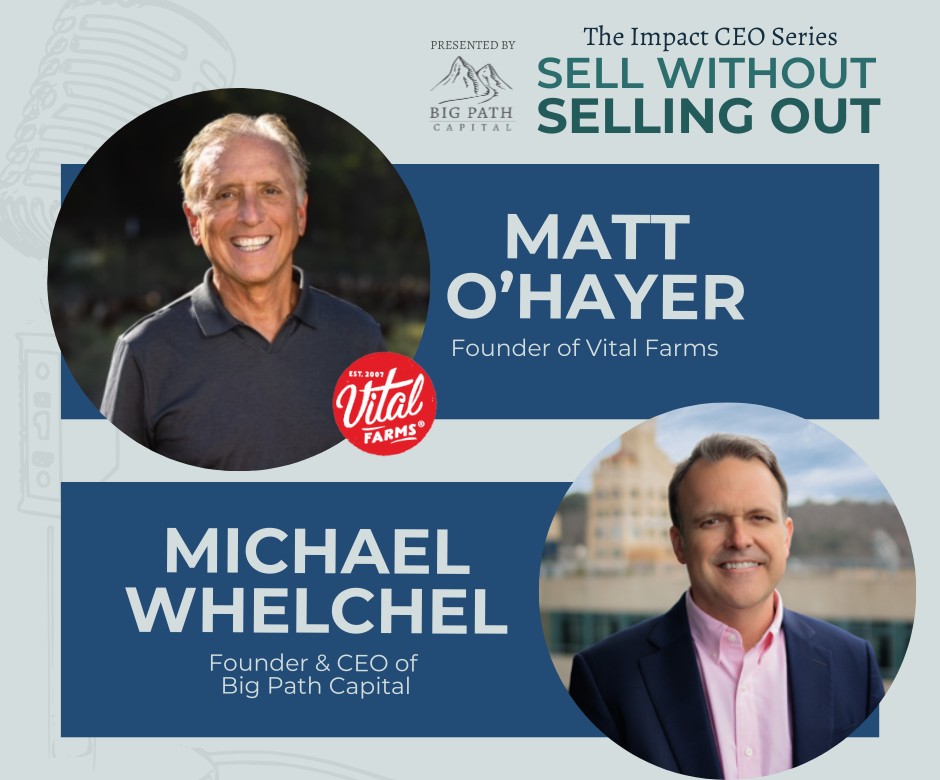Chicken or the egg? At Vital Farms, both are valued. Thanks to its purpose-driven business model, the company has nurtured relationships with egg farmers, shareholders, and other stakeholders while growing its bottom line.
In guiding Vital Farms to annual sales that now top $600 million, Founder Matt O’Hayer took a path guided by purpose. That meant prioritizing relationships with stakeholders — including a network of family farmers with pasture-raised hens — while connecting with impact-minded investors to grow the business.
O’Hayer discussed the company’s journey and lessons learned on combining purpose and profit during the first of a series of online discussions led by Big Path Capital Founder and CEO Michael Whelchel. In the inaugural interview in the “Sell Without Selling Out” series, their conversation covered topics including how a dedication to stakeholder capitalism has served as a strong foundation for Vital Farms. The company has a commitment to providing premium pasture-raised eggs from a network of farms that meet its standards.
“Our stakeholders are our customers, our employees, our vendors, our shareholders, and lastly our communities and the environment where we work,” O’Hayer said. “So all big decisions made for the long-term are made for the long-term benefit of those five stakeholders. A lot of the time, it’s not in the short-term interest of a lot of those stakeholders to make the decision we have to make. But we consider them all as if they’re at the table.”
Whelchel said Big Path’s work with Vital Farms was a prime example of how the right capital and the right process can ensure the ongoing existence of a purpose-driven company’s mission and legacy. “We work with companies like Vital Farms helping them raise growth equity through an exit,” he said. “It’s really to help make sure our clients bring in that right type of capital.”
Planting the Seed for a Long-Term Relationship and Strong Business Growth
In recalling his first conversation with Whelchel in 2015, O’Hayer made it clear he didn’t want to bring in shareholders who would negatively influence Vital Farms’ mission — and Big Path delivered. “You had a curated list of hundreds of private equity firms that raised their money around only investing in what you called impact. I had never heard that term before; it was before the term ESG really existed or became a buzzword,” he said.
O’Hayer said the conversation with Whelchel planted a seed that grew into a yearslong relationship with Big Path and numerous private equity deals, including the sale of 10% of the business. Through the relationship, Vital Farms added investors and board members who value a stakeholder-driven business model. “It’s no surprise to the people who came into our deal who we were as a company,” he said.
Some of the investors he connected with through Big Path would play a mission-supporting role years later, during a series of ups and downs in the egg market in 2015-2016 related to avian influenza. While Vital Farms avoided most of the pricing impacts when the outbreak led to a loss of more than 50 million hens, the sudden price drop when the overall egg supply rebounded presented a business challenge.
O’Hayer and other company leaders crafted a plan to help Vital Farms egg suppliers survive the price drop. They would pay the farmers for the profit they would’ve made that year while asking them to “pause the flock” — i.e. not provide any eggs. “That was going to wipe out our profit for the year, but we thought it was the right thing to do,” he said.
They presented the plan to Vital Farms’ Board of Directors, which included several private equity firms that O’Hayer met thanks to Whelchel and Big Path. Their unanimous decision was swift and mission-reaffirming. “That conversation at the board level lasted about 12 seconds,” O’Hayer said. “We had the right shareholders. We had the right directors, which were basically the private equity firms, and they cared about our farmers.”
How a Temporary Loss Reinforced Purpose and Led to Future Financial Gains
While that decision harmed Vital Farms’ bottom line in 2016 — wiping out most of its earnings for the year — it solidified the company’s relationship with its egg farmers and provided a foundation for strong future financial growth. “The long-term impact was in subsequent years everybody was scrambling to get farmers, and we had a line of 300 family farms to come produce for us,” O’Hayer said.
He credits the board’s decision and support in helping to nurture Vital Farms’ growth then and now, and Big Path’s role in identifying investors who value purpose as well as profit. “The investors come into these things with their eyes wide open,” O’Hayer said. “There was no surprise who we were as a company.”
It also reaffirms Big Path’s belief that capital can be used for growth and good, Whelchel said. “That wasn’t a (board) decision that was motivated strictly by charity. There was a longer-term vision of understanding what your mission, what your brand represented, and making a decision that bolstered that brand rather than tearing it down.”
Watch the full conversation to learn more about Vital Farms and stakeholder capitalism:


